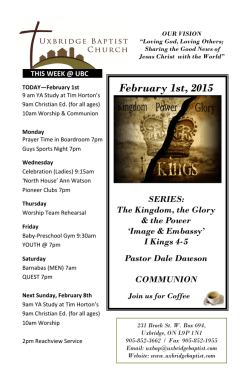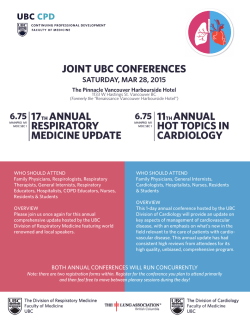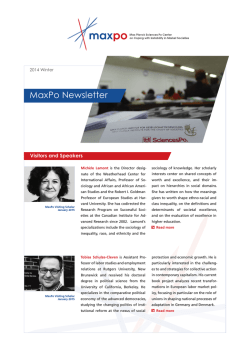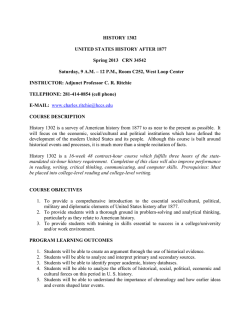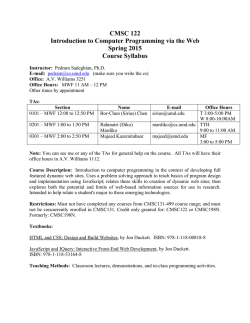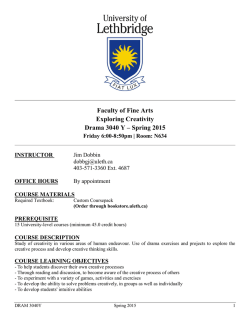
SOCI310A-004, Creese, Gillian
Sociology 310 January 2015 Instructor: Creese Sociology 310: Canadian Society January 2015 Instructor: Gillian Creese Office: Anso 2212 e-mail: [email protected] Office Hours: Tuesday& Thursday: 2:30-3:20 (Anso 2212) 310 lectures: Tuesday & Thursday: 3:30-5:00 (Anso 207) Teaching Assistant: Lily Ivanova Office hours: Course Description: This course applies a critical sociological lens to the society in which we live. We will explore many of the central social processes shaping Canadian society today, including colonialism, Indigenous rights and self government, Quebec sovereignty, multiculturalism, racism, globalization, the welfare state and economic restructuring. Throughout the course we will link contemporary trends with historical contexts to explore the dynamics of social cleavages, competing citizenship claims, social movements, and other pressures reshaping Canada. Drawing on theories of intersectionality, we will also consider how power and privilege intersect along difference axes, particularly ethnicity, racialization, class, gender and sexuality. Required Reading: 1) Pearson Custom Sociology, Sociology 310: Fleras_DB/Creese (selections from Augie Fleras, Unequal Relations: An Introduction to Race, Ethnic and Aboriginal Dynamics in Canada, Edition 7, 2012 (chapters 7, 8, 9, 10 and 12). 2) Pearson Custom Course pack: Sociology 310-Canadian Society (selections from Edward Grabb and Neil Guppy, Social Inequality in Canada: Patterns, Problems, Policies, Edition 5, 2009 (chapters 1, 2, 6, 7, 9, 15 and 24) 3) on-line study cases for the Fleras book, available to read or download at www.pearsoncanada.ca/fleras UBC Bookstore and Koerner Library On-Reserve: The required custom text and course pack are available for purchase at the UBC Bookstore. The two books reproduced in the custom text and course pack (Fleras, Unequal Relations and Grabb & Guppy, Social Inequality in Canada) are also on reserve in Koerner Library. Schedule of weekly readings is found on pages 7-8 of this syllabus. 1 Sociology 310 January 2015 Instructor: Creese Learning Objectives: 1) To understand the main social processes organizing Canadian society 2) To understand the historical origins and contemporary dynamics of social cleavages and competing claims in Canada 3) To develop a critical perspective that links course material with everyday current affairs Course Requirements: Critical reflections: 20% You must write 2 brief (3 page) critical reflections on course readings. Each critical reflection is worth 10%. Due Dates*: January 29 (Week 4); March 12 (Week 9) Details for this assignment are found on page 4 of this syllabus. Research Paper: 35% Research Paper Outline* Course Value: 5% Due Date: February 5 (Week 5) Final Research Paper* Course Value: 30% Due Date: March 26 (Week 11) Details for this assignment are found on pages 5-6 of this syllabus. Final Exam: 35% Course Value: 35% Due Date: April final exam period Format: Essay Questions In-Class small group discussions: 10% There will be 6 in-class small group discussions during the term. You are expected to complete the required reading in order to be an informed participant in group discussions. Each group will turn in a written summary of the discussion at the end of the class period, including the names of all participants. A different student each time will be responsible for submitting discussion notes and reporting back to the class. Students will receive 1.5 marks for each in-class discussion (9% in total), with 1 bonus mark for those who participate in all 6 small group discussions. Small group discussions are scheduled for each of the following classes: Jan 15, Jan 29, Feb 12, March 5, March 19, and April 2. It is not possible to make up for missed small group discussions. * Extensions for written assignments will only be granted for illness, family crises, or other unforeseen events. Other late assignments will be subject to penalties. 2 Sociology 310 January 2015 Instructor: Creese Academic Integrity is an integral part of all universities, and violations of academic integrity cannot be tolerated, even if they are unintentional. Familiarize yourself with relevant UBC policies: Plagiarism policy: http://www.calendar.ubc.ca/vancouver/index.cfm?tree=3,54,111,959 Guide to academic integrity: http://learningcommons.ubc.ca/guide-to-academic-integrity/ UBC policies, procedures and guidelines: http://research.ubc.ca/ore/policies-proceduresguidelines Faculty of Arts grading guidelines: http://legacy.arts.ubc.ca/faculty-ampstaff/resources/courses-and-grading/grading-guidelines.html Writing Support: For those who need support with academic writing, free tutorials are available to all students at UBC. For more information contact Continuing Studies Writing Resources at: http://cstudies.ubc.ca/writing/resources.html 3 Sociology 310 January 2015 Instructor: Creese Critical Reflections: You will produce 2 critical reflections on the readings for the course. These are intended to spur you to actively engage with the literature and the issues discussed in class. 1) Indigenous issues: readings for weeks 2-4: due January 29. 2) Immigration, multiculturalism and racism: readings for weeks 7-9: due March 12. The critical reflections are due in class on the due date. Please do not e-mail assignments. If you cannot attend class use the department drop-box (beside the mail room). Penalties will be imposed for late submissions. This assignment is not intended to be a summary of the readings. It is intended as short ‘thought pieces’ that convey how you are thinking about the material, thoughts about specific points or issues raised in at least two class readings. For example, you can use these pieces to disagree with an author’s arguments or conclusions; to extend the analysis in somewhat different directions; to contribute additional insights; to raise additional questions or points that you think are important; or you may wish to make links between readings in different weeks; to evaluate points of disagreement between authors; or to draw analytical connections to current events. Each reflection should be about 3 pages double-spaced. Be sure to include citations for the readings you address, and list of references cited. Grading Criteria: These assignments will be graded on the following criteria: Demonstrates a sound grasp of the class readings. Offers some additional insights, questions, or thoughts. Reflections are connected to broader themes in the course and/or to sociological concepts and theories. Is well written, clearly organized, and persuasively argued. Course Value: 20% Each assignment is worth 10% of the grade. 4 Sociology 310 January 2015 Instructor: Creese Research Paper: The purpose of this assignment is to extend insights drawn from course readings, to connect class discussions to current events in Canada, and to demonstrate research and critical thinking skills. Choose a recent newspaper article that addresses one of the themes covered in the course. The newspaper article should be extracted from one of the following newspapers: The Globe and Mail, The National Post or The Vancouver Sun. If you wish to use an article from a different newspaper you must get prior permission from the instructor. Choose an article published in the last 6 months. The best way to find an appropriate article is to read newspapers daily to see what peaks your interest. All are available online (http://www.theglobeandmail.com; http://www.vancouversun.com/index.html; http://www.nationalpost.com/index.html) Find an article that connects to one of the themes discussed in the course: for example, indigenous rights movements, relations between Quebec and the rest of Canada, issues related to immigration, multiculturalism, racism, poverty, homelessness, corporate concentration, etc. The newspaper article will provide the starting point for your paper; use it to ask a sociological research question about the nature of contemporary Canadian society. Draw on course material and a minimum of 6 additional relevant scholarly publications to answer the question you pose in the essay. To find academic journal articles related to your topic conduct a subject search of Sociological Abstracts (located under Indexes and Databases on-line at UBC library). To find relevant scholarly books conduct an on-line key word or subject search of the UBC book collection. All searches can be done at http://search.library.ubc.ca. There are two parts to this assignment. Part 1: Research Paper Outline: Course Value: 5% Due Date: February 5 (Week 5) Length: 1 page (single-spaced) plus bibliography 1) Attach a copy of the newspaper article (be sure to include full citations – newspaper name, author, date of publication, page number or url…) 2) Formulate a sociological research question that connects the events reported in the article with a broader theme discussed in the course. This should be an analytical question that requires additional research to answer. 5 Sociology 310 January 2015 Instructor: Creese 3) Provide a point form outline of your paper. What kinds of evidence (research data, concepts) will you need to employ to build an argument to answer your research question? What competing explanations will you evaluate? What conclusions will you draw? 4) Include a bibliography of sources to be consulted. Your paper must include a minimum of 6 scholarly articles (published in academic journals or academic books) in addition to relevant course readings. It is essential that you skim your sources to ensure relevance for answering your research question. (Hint: make sure the sources deal with trends in Canada.) Part 2: Final Research Paper: Course Value: 30% Due Date: March 26, 2015 Length: 6 pages, double-spaced, 12 point font (no smaller than this type), plus bibliography; attach newspaper article and graded outline. 1) Attach the graded Outline (with instructor’s/RA’s comments on it) 2) Attach a copy of the newspaper article (be sure to include full citations – newspaper name, date of publication, page number or url…) 3) Include an introduction that frames the research question and links it to the chosen newspaper article. 4) Marshall and evaluate evidence to support your arguments; draw data and scholarly arguments from a variety of sources; evaluate competing claims and explanations; build a coherent argument. 5) Answer your question. Draw conclusions that are substantiated by your research data. 6) Cite all sources used to write the paper using APA style (author’s surname, year of publication and page number). The UBC link for APA citation style guide can be found at: http://wiki.ubc.ca/images/6/6f/Apastyle.pdf This includes newspaper sources, class readings, and other scholarly research you have consulted (at least 6 additional scholarly journal articles or books). Include a bibliography at the end of the paper. Failure to reference properly constitutes plagiarism (presenting someone else’s ideas as your own) and will result in a failing grade. Research papers will be graded on the following criteria: Demonstrates relevance of article/research questions to the course. Appropriate choices of scholarly research sources Makes good use of sources. Good organization and coherent development of arguments. Demonstrates critical thinking and complex analysis. Presents clear writing and coherent communication of ideas. 6 Sociology 310 January 2015 Instructor: Creese Lecture and Reading Schedule Weeks 1: January 6 and 8: Introduction Week 2:January 13 and 15: Conceptualizing Canada Reading: Fleras, “This Adventure Called Canada-Building” Small Group Discussion January 15 Week 3: January 20 and 22: Indigenous Peoples and Government Policies Reading, Fleras, “Aboriginal Peoples in Canada: Repairing the Relationship” Week 4: January 27 and 29: Indigenous resistance and the struggle for selfdetermination Reading: On-line study cases: Fleras: 7.1 “Residential Schools: Assimilation or Genocide? (61-65); 7.3 “Nisga’a Self Governance: Assimilation, Accommodation, or Autonomy?”(67-70); Recommended: 7.4 “The Caledonia Reclamation Crisis: A Canary in the Mine Shaft of Canada- Aboriginal Peoples Relations” (70-77) Small Group Discussion January 29 Due January 29: Critical Reflection 1 Week 5: February 3 and 5: Two Solitudes? Quebec in Canada Reading: Fleras, “The Quebec Question: The Canadian Quandary” Due February 5: Research Paper Outline Week 6: February 10 and 12: Quebec Sovereignty and Referendums Reading: On-line study cases: Fleras 8.1 “Duelling Nationalisms and Intersecting Sovereignties” (87-89); 8.2 “Crisis, what crisis? Reasonable accommodation of ethnocultural religious diversities in Quebec” (89-93) Small Group Discussion February 12 Due February 12: Critical Reflection 2 Mid-term Break: February 16 to 20; no class February 17 and 19. 7 Sociology 310 January 2015 Instructor: Creese Week 7: February 24 and 26: Immigration Reading: Fleras, “Immigrants and Immigration” On-line study cases: Fleras 9.5 “Canada’s Temporary Foreign Worker Program: Fine Tuning or Fatal Error?” (110-112) Week 8: March 3 and 5: Multiculturalism Reading, Fleras,“Multiculturalism as Canada-Building Governance” On-line study cases: Fleras 6.1 “The Politics of the Hijab” (56-59) Small Group Discussion March 5 Week 9: March 10 and 12: Racialization and Racism Reading: On-line study cases: Fleras 3.1 “Chinese Immigration to Canada: ‘Yellow Peril’ or White Xenophobia?” (20-22); 3.4 “Language as everyday racism: Racializing ‘visible minority’” (26-27);4.3 “Ethnic enclaves: Ghettoes or comfort zones?” (47-48); 5.1 “Being discredited/ getting accredited”(49-51) Due March 12: Critical Reflection 3 ALL READINGS IN WEEKS 10-12 ARE IN THE CUSTOM COURSE PACK Week 10: March 17 and 19: Poverty and the welfare state Davies, “The distribution of wealth and economic inequality” Guppy and Hawshaw, “Defining, Measuring and Reducing Poverty” Peressini, “Persistent Inequalities: Homelessness in Canada” Small Group Discussion March 19 Week 11: March 24 and 26: Globalization and democracy Carroll, “Corporate Canada, Globalization and Neoliberal Democracy” Grabb and Hwang, “Corporate Concentration, Foreign Ownership, and State Involvement in the Canadian Economy” Due March 26: Final Research Paper Week 12: March 31 and April 2: Economic restructuring Lowe and Lehmann, “Labour Markets, Inequality, and the Future of Work” Creese & Beagan, “Gender at Work: Strategies for Equality in Neoliberal Times” Small Group Discussion April 2 Due April 2: Critical Reflection 4 Week 13: April 7 and 9: Wrap up and review for final exam 8
© Copyright 2026
